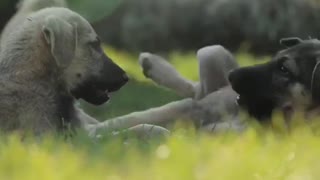My dogs knows what to do when I'm cold
Why dogs are so attached with humans imp facs:-
Dogs (Canis familiaris) have coexisted with humans for more than 30,000 years and are woven into human society as partners to humans. Interactions between dogs and humans affect both species’ endocrine systems and produce a positive loop of bonding via oxytocin1. This oxytocinergic bonding is commonly found in strong intraspecies connections, such as those between mother–infant and mating partners2, and it contributes to the survival of themselves and their offspring. Dogs are suggested to have had acquired human-like communication skills as a by-product of the mutation of the stress response endocrine system during the domestication process3, and as a result, humans and dogs may have become able to coexist by applying this bonding system to each other beyond species. Dogs have high sensitivity to human gaze direction and attention status4,5,6,7,8 and change their behaviour depending on humans. They often naturally behave similarly to humans, and prefer humans who synchronise with them9. They can also copy human actions at various levels, such as mimicry, automatic imitation, behavioural synchronisation, selective imitation, and over-imitation, which may also indicate a high sensitivity of dogs to human behaviour10,11,12,13,14,15,16.
In decision-making, copying the behaviours of others is an effective way to reduce uncertainty about the environmental knowledge, and can help individuals to acquire an adaptive behaviour at a lower cost than by learning it by themselves. Among the copying strategies, conformity, that is copying the behavioural decision presented by the majority, has been well studied in many animals17,18. Since conformity was first reported in humans, some studies were conducted on primates, such as comparisons among human infants, chimpanzees, and orangutans, to investigate its evolutionary root19,20. Other species in different phylogenetic branches from humans have also been examined from the perspective of the convergent evolution of conformity21,22,23. As van Leeuwen and Haun24 defined, conformity is the tendency to forgo personal information by adopting the cultural variant that is used by the majority, so it is controversial whether some non-human studies match the definition of conformity or not18. Nevertheless, the behavioural adaptation of copying the majority choice could exist in animals living in groups under certain conditions.
-
 1:58
1:58
Reptile Rescue
2 years ago $0.06 earnedYou Know It's Damn Cold When...
144 -
 0:35
0:35
Fear Not Experience News Network
6 months agoThe Animals Know What's Up
1962 -
 0:07
0:07
Plumpsplayground
1 year agoHow my Dog let's me know I'm too clingy! 🐶😅
5 -
 0:09
0:09
Green
3 years ago $0.01 earnedDog Don't Care
148 -
 1:55
1:55
Barkmind - A place for dogs, pets, and pet lovers
1 year agoWhy Is My Dogs Mouth Cold? - Barkmind
95 -
 0:33
0:33
PJvideo
3 years ago $0.02 earnedDog's mood changes instantly
170 -
 10:30
10:30
Lampley Brothers Farming
9 months agoDog you can't help
-
 8:14
8:14
The Pet Parenting Reset
2 years agoDog Misbehaving? Here's Why...
89 -
 0:15
0:15
Nashwanali
3 years agoDog's very friendly
40 -
 0:09
0:09
Plumpsplayground
1 year agoWhen your dog decides he's had enough! 🐶
1